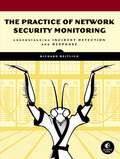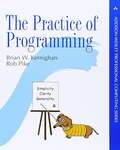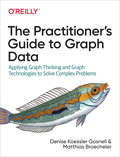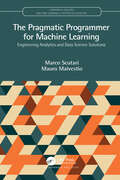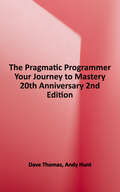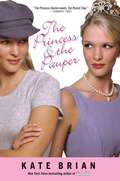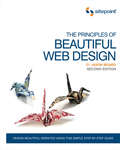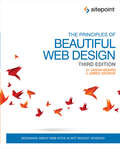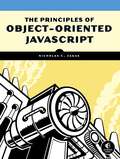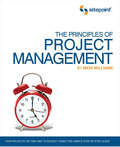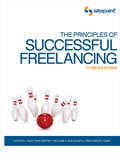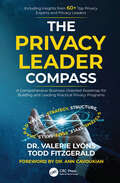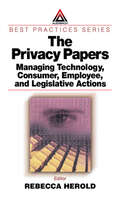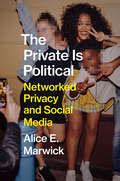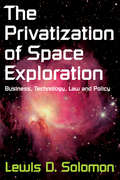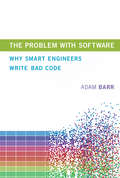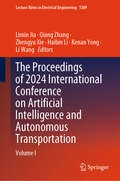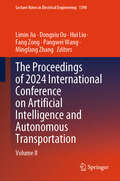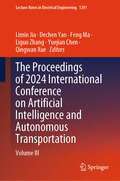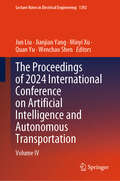- Table View
- List View
The Practice of Network Security Monitoring: Understanding Incident Detection and Response
by Richard BejtlichNetwork security is not simply about building impenetrable walls—determined attackers will eventually overcome traditional defenses. The most effective computer security strategies integrate network security monitoring (NSM): the collection and analysis of data to help you detect and respond to intrusions.In The Practice of Network Security Monitoring, Mandiant CSO Richard Bejtlich shows you how to use NSM to add a robust layer of protection around your networks—no prior experience required. To help you avoid costly and inflexible solutions, he teaches you how to deploy, build, and run an NSM operation using open source software and vendor-neutral tools.You'll learn how to:–Determine where to deploy NSM platforms, and size them for the monitored networks–Deploy stand-alone or distributed NSM installations–Use command line and graphical packet analysis tools, and NSM consoles–Interpret network evidence from server-side and client-side intrusions–Integrate threat intelligence into NSM software to identify sophisticated adversariesThere’s no foolproof way to keep attackers out of your network. But when they get in, you’ll be prepared. The Practice of Network Security Monitoring will show you how to build a security net to detect, contain, and control them. Attacks are inevitable, but losing sensitive data shouldn't be.
The Practice of Programming
by Brian W. Kernighan Rob PikeWith the same insight and authority that made their book The Unix Programming Environment a classic, Brian Kernighan and Rob Pike have written The Practice of Programming to help make individual programmers more effective and productive. <P><P> The practice of programming is more than just writing code. Programmers must also assess tradeoffs, choose among design alternatives, debug and test, improve performance, and maintain software written by themselves and others. At the same time, they must be concerned with issues like compatibility, robustness, and reliability, while meeting specifications. <P><P> The Practice of Programming covers all these topics, and more. This book is full of practical advice and real-world examples in C, C++, Java, and a variety of special-purpose languages. It includes chapters on: <P><P> <P>• debugging: finding bugs quickly and methodically <P>• testing: guaranteeing that software works correctly and reliably <P>• performance: making programs faster and more compact <P>• portability: ensuring that programs run everywhere without change <P>• design: balancing goals and constraints to decide which algorithms and data structures are best <P>• interfaces: using abstraction and information hiding to control the interactions between components <P>• style: writing code that works well and is a pleasure to read <P>• notation: choosing languages and tools that let the machine do more of the work <P><P> Kernighan and Pike have distilled years of experience writing programs, teaching, and working with other programmers to create this book. Anyone who writes software will profit from the principles and guidance in The Practice of Programming.
The Practitioner's Guide to Graph Data: Applying Graph Thinking and Graph Technologies to Solve Complex Problems
by Denise Gosnell Matthias BroechelerGraph data closes the gap between the way humans and computers view the world. While computers rely on static rows and columns of data, people navigate and reason about life through relationships. This practical guide demonstrates how graph data brings these two approaches together. By working with concepts from graph theory, database schema, distributed systems, and data analysis, you’ll arrive at a unique intersection known as graph thinking.Authors Denise Koessler Gosnell and Matthias Broecheler show data engineers, data scientists, and data analysts how to solve complex problems with graph databases. You’ll explore templates for building with graph technology, along with examples that demonstrate how teams think about graph data within an application.Build an example application architecture with relational and graph technologiesUse graph technology to build a Customer 360 application, the most popular graph data pattern todayDive into hierarchical data and troubleshoot a new paradigm that comes from working with graph dataFind paths in graph data and learn why your trust in different paths motivates and informs your preferencesUse collaborative filtering to design a Netflix-inspired recommendation system
The Pragmatic Programmer for Machine Learning: Engineering Analytics and Data Science Solutions (Chapman And Hall/crc Machine Learning And Pattern Recognition Ser.)
by Marco Scutari Mauro MalvestioMachine learning has redefined the way we work with data and is increasingly becoming an indispensable part of everyday life. The Pragmatic Programmer for Machine Learning: Engineering Analytics and Data Science Solutions discusses how modern software engineering practices are part of this revolution both conceptually and in practical applictions. Comprising a broad overview of how to design machine learning pipelines as well as the state-of-the-art tools we use to make them, this book provides a multi-disciplinary view of how traditional software engineering can be adapted to and integrated with the workflows of domain experts and probabilistic models. From choosing the right hardware to designing effective pipelines architectures and adopting software development best practices, this guide will appeal to machine learning and data science specialists, whilst also laying out key high-level principlesin a way that is approachable for students of computer science and aspiring programmers.
The Pragmatic Programmer: Your Journey To Mastery, 20th Anniversary Edition
by David Thomas Andrew HuntFor twenty years, the lessons from The Pragmatic Programmer have helped a generation of programmers examine the very essence of software development, independent of any particular language, framework, or methodology. This classic title is regularly featured on “Top Ten” lists, and many corporations issue it to their new hires. This new 20th Anniversary Edition offers a fresh look at the modern development landscape, cutting through the “business as usual” and tired advice from the net to help guide you through the next twenty years and beyond. Featuring new tips, new topics, and revisions throughout, you don’t want to miss this one. Published by Addison Wesley by special arrangement with the Pragmatic Bookshelf.
The Presidency and Immigration Policy: Rhetoric and Reality
by Matthew Eshbaugh-Soha Eric Gonzalez Juenke Andrea SilvaThis comprehensive analysis of presidential immigration rhetoric quantifies the frequency, tone, and efficacy of public mentions of immigrants and immigration policy by the presidents from Washington through Biden. The book also explores the intersection of the presidential role with that of the other key actors in the immigration policy system—notably the press, the public, and Congress. For students of immigration studies, presidential studies, and political communication, this book also poses the question of which is of the greatest significance to the immigration policy agenda: presidential leadership making immigration a top priority or existing legislative support for comprehensive immigration reform.
The Princess and the Pauper
by Kate BrianCarina, a real European princess, is dying to hook up with the sexy American rock star she met online. Too bad about all those bodyguards watching her every move. Then Carina spots her down-and-out near-twin, Julia. For a fast ten grand, Julia grabs the gown and the crown, and the girls swap identities for a day. Before long Princess Carina is trapped on a sketchy bus full of roadies, and pauper Julia is jetting off to... some small foreign country? Only a storybook ending can get these two poseurs back to where they belong.
The Principles of Beautiful Web Design: 101 Essential Tips, Tricks And Hacks
by Jason BeairdThis second edition of The Principles of Beautiful Web Design is the ideal book for people who can build websites, but are seeking the skills and knowledge to visually enhance their sites.This book will teach you how to:Understand the process of what makes "good design," from discovery through to implementationUse color effectively, develop color schemes, and create a paletteCreate pleasing layouts using grids, the rule of thirds, and symmetryEmploy textures: lines, points, shapes, volumes, and depthApply typography to make ordinary designs look greatChoose, edit, and position effective imageryAnd lots more...This revised, easy-to-follow guide is illustrated with beautiful, full-color examples, and leads readers through the process of creating great designs from start to finish.It also features:Updated information about grid-based designHow to design for mobile resolutionsInformation about the future of web fonts including @font-faceCommon user-interface patterns and resources
The Principles of Beautiful Web Design: Designing Great Web Sites is Not Rocket Science!
by Jason Beaird James GeorgeThe Principles of Beautiful Web Design is the ideal book for people who can build websites, but are seeking the skills and knowledge to visually enhance their sites.This book will teach you how to:Understand what makes "good design," from discovery through to implementationUse color effectively, develop color schemes, and create a paletteCreate pleasing layouts using grids, the rule of thirds, and symmetryEmploy textures: lines, points, shapes, volumes, and depthApply typography to make ordinary designs look greatChoose, edit, and position effective imageryAnd lots more...This easy-to-follow guide is illustrated with beautiful, full-color examples, and will lead you through the process of creating great designs from start to finish. The third edition of this book has been greatly revised and now features:Updated and expanded coverage of mobile and responsive web design (RWD)A new sample projectNew sections on user interface and icon designCommon user-interface patterns and resources
The Principles of Object-Oriented JavaScript
by Nicholas C. Zakas<p>If you've used a more traditional object-oriented language, such as C++ or Java, JavaScript probably doesn't seem object-oriented at all. <p>It has no concept of classes, and you don't even need to define any objects in order to write code. But don't be fooled—JavaScript is an incredibly powerful and expressive object-oriented language that puts many design decisions right into your hands.In The Principles of Object-Oriented JavaScript, Nicholas C. Zakas thoroughly explores JavaScript's object-oriented nature, revealing the language's unique implementation of inheritance and other key characteristics. <p>You'll learn:–The difference between primitive and reference values–What makes JavaScript functions so unique–The various ways to create objects–How to define your own constructors–How to work with and understand prototypes–Inheritance patterns for types and objectsThe Principles of Object-Oriented JavaScript will leave even experienced developers with a deeper understanding of JavaScript. <p>Unlock the secrets behind how objects work in JavaScript so you can write clearer, more flexible, and more efficient code.
The Principles of Project Management (SitePoint (SitePoint (SitePoint (SitePoint: Project Management): Project Management)
by Meri WilliamsThe Principles of Project Management lays out clear steps that anyone can follow to get projects done right, and delivered on time.This full color book covers:Why Project Management is importantThe 6 fundamental truths of project managementGetting started: Discovering, Initiating, Planning and Resourcing a projectGetting the Job Done: Executing and controllingKeeping it Smooth: Communication, collaboration and managing changeFollowing through: Ongoing support and maintenance, measuring operational successResources: Review of various tools, recommended reading, professional resources for project managementShort, and to the point, this book aims to do to provide a solid foundation for anyone who finds themselves responsible for executing projects.From the Back CoverEvery project you manage will be unique. Scope, budgets, team dynamics, and timeframes will differ. As a project manager, the most important factor in achieving project success will be your understanding of The Principles Of Project Management. This book will show you that project management isn't rocket science: using the information contained in this book, you'll deliver projects on time and on budget, again and again.With The Principles Of Project Management you'll:Learn how to start every project on the right foot.Master the planning, execution, and control of your projects.Discover the secrets of effective communication and change management.Identify project warning signals and learn to keep your projects on track.Understand the benefits of using the right tools, resources, and people.Learn how to give a superstar project handover.And much, much more
The Principles of Successful Freelancing: Control Your Destiny - Become a Successful Freelancer Today!
by Miles BurkeThinking about becoming your own boss and embarking on the wonderful and rewarding journey of freelancing? The Principles of Successful Freelancing is for you. In this easy-to follow guide you'll learn what's important in transforming your skills into a booming freelance business.This book leads you through the entire process, from getting started, through to winning and keeping loyal clients. Running a successful freelance business is easy, and with the information in this book, you'll confidently turn your freelancing dream into a profitable reality. Learn how to make a smooth transition into freelancing Understand how to effectively manage your money Ensure you spend your time on the right activities Discover why a work/life balance is important Learn how your network can support you and your business Overcome your fear of sellingAnd much more ...The 12 Principles Of Successful Freelancing Get OrganizedKeep your workspace tidy and plan ahead(short- and long-term).Control StressRemain calm and work through issues to avoid early burnout..ResearchSpend quality time researching your proposed business-it's more than a five minute web surf.Be PassionateLove your work! You should enjoy what you do for a living.BudgetSave for a rainy day rather than spend every centas it comes in.Value your HealthBad health stops you from working. Take time to exercise and maintain a nutritious diet.Embrace SellingEnjoy the sales challenge-it's easier than you think!Satisfy CustomersDon't do average work-exceed their expectations and make them need you.Grow Your NetworkValue family and friends' support, and meet new people all the time.Maintain CashflowIt's what is in the bank that counts, not what you are billing-understand the difference.Continually LearnKeep acquiring new skills and knowledge, every week. Let it slip and you could be left behind.Achieve a Work/Life BalanceYour life should be more than work-maintain a good balance for health and success.
The Privacy Engineer's Manifesto: Getting from Policy to Code to QA to Value
by Jonathan Fox Michelle Finneran Dennedy Thomas R. Finneran"It''s our thesis that privacy will be an integral part of the next wave in the technology revolution and that innovators who are emphasizing privacy as an integral part of the product life cycle are on the right track. " --The authors of The Privacy Engineer''s Manifesto The Privacy Engineer''s Manifesto: Getting from Policy to Code to QA to Value is the first book of its kind, offering industry-proven solutions that go beyond mere theory and adding lucid perspectives on the challenges and opportunities raised with the emerging "personal" information economy. The authors, a uniquely skilled team of longtime industry experts, detail how you can build privacy into products, processes, applications, and systems. The book offers insight on translating the guiding light of OECD Privacy Guidelines, the Fair Information Practice Principles (FIPPs), Generally Accepted Privacy Principles (GAPP) and Privacy by Design (PbD) into concrete concepts that organizations, software/hardware engineers, and system administrators/owners can understand and apply throughout the product or process life cycle--regardless of development methodology--from inception to retirement, including data deletion and destruction. In addition to providing practical methods to applying privacy engineering methodologies, the authors detail how to prepare and organize an enterprise or organization to support and manage products, process, systems, and applications that require personal information. The authors also address how to think about and assign value to the personal information assets being protected. Finally, the team of experts offers thoughts about the information revolution that has only just begun, and how we can live in a world of sensors and trillions of data points without losing our ethics or value(s). . . and even have a little fun. The Privacy Engineer''s Manifesto is designed to serve multiple stakeholders: Anyone who is involved in designing, developing, deploying and reviewing products, processes, applications, and systems that process personal information, including software/hardware engineers, technical program and product managers, support and sales engineers, system integrators, IT professionals, lawyers, and information privacy and security professionals. This book is a must-read for all practitioners in the personal information economy. Privacy will be an integral part of the next wave in the technology revolution; innovators who emphasize privacy as an integral part of the product life cycle are on the right track. Foreword by Dr. Eric Bonabeau, PhD, Chairman, Icosystem, Inc. & Dean of Computational Sciences, Minerva Schools at KGI. What you''ll learn What''s at stake as concerns data privacy become critical considerations for users, developers, and enterprise stakeholders Comprehensive foundational understanding of the issues and how they are interconnected What the emerging job description of "privacy engineer" means Key development models for privacy architecture How to assemble an engineering privacy tool box (including developing privacy use cases and requirements Organizational design implications of privacy engineering Quality Assurance (QA) methodologies for privacy policy compliance Models for valuing data The 10-point Manifesto of the Privacy Engineer Who this book is for The Privacy Engineer''s Manifesto is designed to serve multiple stakeholders: Anyone who is involved in designing, developing, deploying, and reviewing products, processes, applications, and systems that process personal information, including software/hardware engineers, technical program and product managers, support and sales engineers, system integrators, IT professionals, lawyers, and information privacy and security professionals. A must read for all practitioners in the personal information economy. Table of Contents Part 1 - Getting Your Head Around Privacy Chapter 1: Technology Evolution and People Chapter 2: Foundational Concepts and Frameworks Chapter 3: Data and Privacy Governance Concepts Part 2 - The Privacy Engineering Pr...
The Privacy Leader Compass: A Comprehensive Business-Oriented Roadmap for Building and Leading Practical Privacy Programs
by Todd Fitzgerald Valerie LyonsCongratulations! Perhaps you have been appointed as the Chief Privacy Officer (CPO) or the Data Protection Officer (DPO) for your company. Or maybe you are an experienced CPO/DPO, and you wonder – "what can I learn from other successful privacy experts to be even more effective?" Or perhaps you are considering a move from a different career path and deciding if this is the right direction for you. Seasoned award-winning Privacy and Cybersecurity leaders Dr. Valerie Lyons (Dublin, Ireland) and Todd Fitzgerald (Chicago, IL USA) have teamed up with over 60 award-winning CPOs, DPOs, highly respected privacy/data protection leaders, data protection authorities, and privacy standard setters who have fought the tough battle. Just as the #1 best-selling and CANON Cybersecurity Hall of Fame winning CISO Compass: Navigating Cybersecurity Leadership Challenges with Insights from Pioneers book provided actionable advice to Chief Information Security Officers, The Privacy Leader Compass is about straight talk – delivering a comprehensive privacy roadmap applied to, and organized by, a time-tested organizational effectiveness model (the McKinsey 7-S Framework) with practical, insightful stories and lessons learned. You own your continued success as a privacy leader. If you want a roadmap to build, lead, and sustain a program respected and supported by your board, management, organization, and peers, this book is for you.
The Privacy Papers: Managing Technology, Consumer, Employee and Legislative Actions (ISSN)
by Rebecca HeroldToday, more than ever, organizations have to cope with increased concerns regarding privacy issues. These concerns are not limited to consumer fears about how information collected by Web sites will be used or misused. They also involve broader issues, including data collected for direct response marketing, privacy of financial and health records,
The Private Is Political: Networked Privacy and Social Media
by Alice E. MarwickA compelling firsthand investigation of how social media and big data have amplified the close relationship between privacy and inequality Online privacy is under constant attack by social media and big data technologies. But we cannot rely on individual actions to remedy this—it is a matter of social justice. Alice E. Marwick offers a new way of understanding how privacy is jeopardized, particularly for marginalized and disadvantaged communities—including immigrants, the poor, people of color, LGBTQ+ populations, and victims of online harassment. Marwick shows that few resources or regulations for preventing personal information from spreading on the internet. Through a new theory of “networked privacy,” she reveals how current legal and technological frameworks are woefully inadequate in addressing issues of privacy—often by design. Drawing from interviews and focus groups encompassing a diverse group of Americans, Marwick shows that even heavy social media users care deeply about privacy and engage in extensive “privacy work” to protect it. But people are up against the violation machine of the modern internet. Safeguarding privacy must happen at the collective level.
The Privatization of Space Exploration: Business, Technology, Law and Policy (The\privatization Of Space Exploration Ser.)
by Lewis D. SolomonSpace was at the center of America's imagination in the 1960s. President John F. Kennedy's visionary statement captured the mood of the day: "We choose to go to the moon in this decade and do the other things, not because they are easy, but because they are hard." The Apollo mission's success in July 1969 made almost anything seem possible, but the Cold War made space flight the province of governmental agencies in the United States. When the Apollo program ended in 1972, space lost its hold on the public interest, as the great achievements wound down. Entrepreneurs are beginning to pick up the slack-looking for safer, more reliable, and more cost effective ways of exploring space. Entrepreneurial activity may make create a renaissance in human spaceflight. The private sector can energize the quest for space exploration and shape the race for the final frontier. Space entrepreneurs and private sector firms are making significant innovations in space travel. They have plans for future tourism in space and safer shuttles. Solomon details current US and international laws dealing with space use, settlement, and exploration, and offers policy recommendations to facilitate privatization. As private enterprise takes hold, it threatens to change the space landscape forever. Individuals are designing spacecraft, start-up companies are testing prototypes, and reservations are being taken for suborbital space flights. With for-profit enterprises carving out a new realm, it is entirely possible that space will one day be a sea of hotels and/or a repository of resources for big business. It is important that regulations are in place for this eventuality. These new developments have great importance, huge implications, and urgency for everyone.
The Pro Tools 2023 Post-Audio Cookbook: A holistic approach to post audio workflows like music production, motion picture, and spoken word
by Emiliano PaternostroTake your projects from vision to victory with Avid Pro Tools in this part-color guide by delivering high-quality results with perfect recipes for every challengeKey FeaturesLearn to edit audio quickly and efficiently using different techniquesDiscover advanced automation techniques used during a mix sessionUnlock Pro Tools' most powerful features and explore their usesPurchase of the print or Kindle book includes a free PDF eBookBook DescriptionPro Tools has long been an industry-standard Digital Audio Workstation (DAW) for audio professionals, but it can often be overwhelming for new and experienced users alike. The Pro Tools 2023 Post-Audio Cookbook acts as a reference guide to the software and breaks down each stage of a project into manageable phases. From planning a session, editing a sequence, performing a mix to printing the final masters, you can approach this book either sequentially or peruse the self-contained recipes. You’ll come to grips with workflows for music production, motion picture, and spoken word production, helping you gain expertise in the area of your choice. You'll learn aspects of music mixing like side chain processing to keep instruments from overshadowing each other and conforming for motion picture. The author’s expertise with Pro Tools will help you discover and incorporate different techniques into your workflows. You’ll also learn to build consistent and replicable workflows and templates by understanding what happens behind the scenes in Pro Tools. With this cookbook, you’ll be able to focus on the creative aspects of your audio production and not get mired by the technical hurdles. By the end of this book, you’ll be well-equipped to handle even the most complex features of Pro Tools to deliver immaculate results for your clients.What you will learnExplore the inner workings of Pro ToolsPlan and organize projects effectivelyEdit audio quickly and efficientlyUnderstand and explore the usage of audio routingBuild effective mix templatesDeliver custom solutions for varied service requirementsUse advanced mixing techniques to enhance sound tracksPick appropriate use cases for different audio effects and pluginsWho this book is forThe book is for audio professionals, sound designers/editors, music engineers, podcast producers, re-recordist mixers, and students looking to learn about Pro Tools and its features. A basic understanding of Digital Audio Workstations and its operations such as import, edit, mix and bounce is a must.
The Probabilistic Vision of the Physical World: A Point of View of Earth Sciences (Lecture Notes in Geosystems Mathematics and Computing)
by Fernando Sansò Alberta AlbertellaThis book investigates the relationship between empirical reality and theoretical modelling in Earth sciences, focusing on how empirical experiments and theoretical models interact. It explores the connection between statistics and probability theory, emphasizing the importance of these tools in understanding the physical world. The first chapter addresses the frequency-probability antinomy, while the second chapter discusses the sources of randomness in modelling. Chapters 3 and 4 delve into statistical inference, covering estimation theory and testing theory. Chapter 5 examines the relationship between discrete-finite models and continuous-infinite dimensional models, particularly random fields, making the concepts accessible to geodesists and geophysicists. Chapter 6 explores modern machine learning and deep learning, highlighting their roots in traditional statistical methods and neural networks. The book concludes with a caution against relying solely on empirical evidence and "black box" algorithms, advocating for the integration of physical laws with empirical models to advance understanding of the physical world. The book is primarily intended for graduate students and researchers in the field of earth sciences with a basic background in probability theory and statistics.
The Problem with Native JavaScript APIs: External JavaScript Libraries Still Matter
by Nicholas C. ZakasMany features inspired by popular JavaScript libraries are now available as native JavaScript APIs in today’s powerful browsers. While that may seem convenient given all of the JavaScript you need to write, relying on these APIs will only make code maintenance more difficult in the long run.In this report, Nicholas Zakas—consultant and former front-end tech leader at Yahoo!—provides a case study to show how different browsers can develop native APIs for the same specification and still end up with different interpretations. You’ll discover how these APIs can tie your code to specific browsers, forcing you to upgrade application logic whenever new browsers and new browser versions are released.
The Problem with Software: Why Smart Engineers Write Bad Code
by Adam BarrAn industry insider explains why there is so much bad software—and why academia doesn't teach programmers what industry wants them to know. Why is software so prone to bugs? So vulnerable to viruses? Why are software products so often delayed, or even canceled? Is software development really hard, or are software developers just not that good at it? In The Problem with Software, Adam Barr examines the proliferation of bad software, explains what causes it, and offers some suggestions on how to improve the situation. For one thing, Barr points out, academia doesn't teach programmers what they actually need to know to do their jobs: how to work in a team to create code that works reliably and can be maintained by somebody other than the original authors. As the size and complexity of commercial software have grown, the gap between academic computer science and industry has widened. It's an open secret that there is little engineering in software engineering, which continues to rely not on codified scientific knowledge but on intuition and experience. Barr, who worked as a programmer for more than twenty years, describes how the industry has evolved, from the era of mainframes and Fortran to today's embrace of the cloud. He explains bugs and why software has so many of them, and why today's interconnected computers offer fertile ground for viruses and worms. The difference between good and bad software can be a single line of code, and Barr includes code to illustrate the consequences of seemingly inconsequential choices by programmers. Looking to the future, Barr writes that the best prospect for improving software engineering is the move to the cloud. When software is a service and not a product, companies will have more incentive to make it good rather than “good enough to ship."
The Proceedings of 2024 International Conference on Artificial Intelligence and Autonomous Transportation: Volume I (Lecture Notes in Electrical Engineering #1389)
by Li Wang Qiang Zhang Limin Jia Zhengyu Xie Haibin Li Kenan YongThis book reflects the latest research trends, methods and experimental results in the field of Artificial Intelligence and Autonomous Transportation, which covers abundant state-of-the-art research theories and ideas. As a vital research area that is highly relevant to current developments in a number of technological domains, the topics covered include Autonomous Transportation Systems, Autonomous Transportation Management and Control Technology, Autonomous Transportation Equipment Technology, Vehicular Networking and Information Security, Emerging Technologies and Future Mobility, Intelligent water transportation technology, Cross-Domain Transportation Technology, and so on. The goal of the proceedings is to provide a major interdisciplinary forum for researchers, engineers, academics, and industry professionals to present the most innovative research and development in the field of Artificial Intelligence and Autonomous Transportation. Engineers and researchers from academia, industry, and government will also explore an insight view of the solutions that combine ideas from multiple disciplines in this area. The volumes serve as an excellent reference work for researchers and graduate students working in the areas of rail transportation, electrical engineering, and information technology.
The Proceedings of 2024 International Conference on Artificial Intelligence and Autonomous Transportation: Volume II (Lecture Notes in Electrical Engineering #1390)
by Limin Jia Hui Liu Dongxiu Ou Fang Zong Pangwei Wang Mingfang ZhangThis book reflects the latest research trends, methods and experimental results in the field of Artificial Intelligence and Autonomous Transportation, which covers abundant state-of-the-art research theories and ideas. As a vital research area that is highly relevant to current developments in a number of technological domains, the topics covered include Autonomous Transportation Systems, Autonomous Transportation Management and Control Technology, Autonomous Transportation Equipment Technology, Vehicular Networking and Information Security, Emerging Technologies and Future Mobility, Intelligent water transportation technology, Cross-Domain Transportation Technology, and so on. The goal of the proceedings is to provide a major interdisciplinary forum for researchers, engineers, academics, and industry professionals to present the most innovative research and development in the field of Artificial Intelligence and Autonomous Transportation. Engineers and researchers from academia, industry, and government will also explore an insight view of the solutions that combine ideas from multiple disciplines in this area. The volumes serve as an excellent reference work for researchers and graduate students working in the areas of rail transportation, electrical engineering, and information technology.
The Proceedings of 2024 International Conference on Artificial Intelligence and Autonomous Transportation: Volume III (Lecture Notes in Electrical Engineering #1391)
by Limin Jia Dechen Yao Feng Ma Liguo Zhang Yuejian Chen Qingwan XueThis book reflects the latest research trends, methods and experimental results in the field of Artificial Intelligence and Autonomous Transportation, which covers abundant state-of-the-art research theories and ideas. As a vital research area that is highly relevant to current developments in a number of technological domains, the topics covered include Autonomous Transportation Systems, Autonomous Transportation Management and Control Technology, Autonomous Transportation Equipment Technology, Vehicular Networking and Information Security, Emerging Technologies and Future Mobility, Intelligent water transportation technology, Cross-Domain Transportation Technology, and so on. The goal of the proceedings is to provide a major interdisciplinary forum for researchers, engineers, academics, and industry professionals to present the most innovative research and development in the field of Artificial Intelligence and Autonomous Transportation. Engineers and researchers from academia, industry, and government will also explore an insight view of the solutions that combine ideas from multiple disciplines in this area. The volumes serve as an excellent reference work for researchers and graduate students working in the areas of rail transportation, electrical engineering, and information technology.
The Proceedings of 2024 International Conference on Artificial Intelligence and Autonomous Transportation: Volume IV (Lecture Notes in Electrical Engineering #1392)
by Quan Yu Jun Liu Jianjian Yang Minyi Xu Wenchao ShenThis book reflects the latest research trends, methods and experimental results in the field of Artificial Intelligence and Autonomous Transportation, which covers abundant state-of-the-art research theories and ideas. As a vital research area that is highly relevant to current developments in a number of technological domains, the topics covered include Autonomous Transportation Systems, Autonomous Transportation Management and Control Technology, Autonomous Transportation Equipment Technology, Vehicular Networking and Information Security, Emerging Technologies and Future Mobility, Intelligent water transportation technology, Cross-Domain Transportation Technology, and so on. The goal of the proceedings is to provide a major interdisciplinary forum for researchers, engineers, academics, and industry professionals to present the most innovative research and development in the field of Artificial Intelligence and Autonomous Transportation. Engineers and researchers from academia, industry, and government will also explore an insight view of the solutions that combine ideas from multiple disciplines in this area. The volumes serve as an excellent reference work for researchers and graduate students working in the areas of rail transportation, electrical engineering, and information technology.
